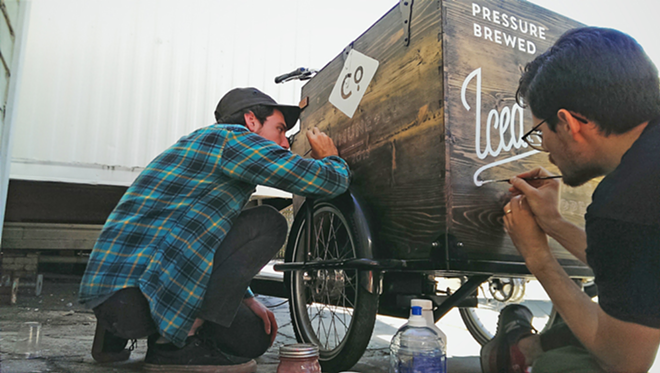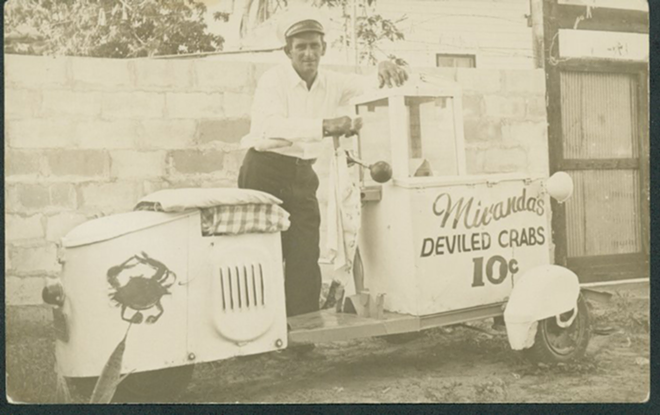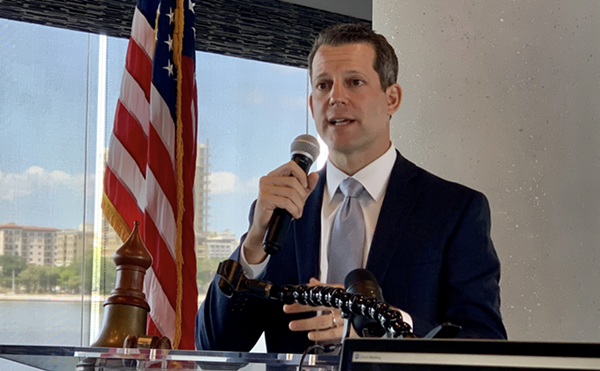A stroll down Ybor City’s Seventh Avenue is an exercise for the senses. Sunlight beams onto cheesy plastic beads dangling over streetlights, panhandlers tell you stories and the sweet smell of cigar rollers’ tobacco always lingers in the air. Restaurants are everywhere, and there are bars on top of bars waiting to lend you a buzz.
What you won’t experience is a mobile vending cart. City code prohibits vendors from selling their wares on wheels.
Joel Davis of Commune + Co. is trying to change that.
Until Davis finds a brick-and-mortar home for his pressure-brewed, nitrous-tapped cold-brew coffee, he’ll use the custom tricycle he built to serve his product on the go. Davis, 31, can be found on the patio of Ybor’s Relevant Church with his trike; he got the boot from his spot outside Tabanero Cigars on the corner of North 16th Street and Seventh Avenue.
Intended to rein in sketchy mobile vending like the guy who sold cigars via hospital gurney, Sec. 27-132, e. was approved in the late ’90s and prohibits vendors within Ybor’s historic district. There are a few exceptions, and conditions that allow vendors to sell at events like parades, festivals and block parties.
The area has a rich, long history of these rolling storefronts, though, and nearly a century ago, there were plenty — knife sharpeners, milk and bread purveyors, the Piruli candy man and Joe “Blue Eyes” Valenti who sold tomatoes from a wagon.
Tampa-born Francisco Miranda, known as “Mr. Miranda The Deviled Crab Man,” is most famous for peddling his shellfish croquettes from a snazzy motorized scooter. Laboring over their crustacean creations daily, Miranda and his wife’s final product became a Tampa street food staple and something of a go-to for workers in the city’s cigar factories and shipyards.
Rodney Kite-Powell, the Saunders Foundation Curator of History at the Tampa Bay History Center, says that the aforementioned Valenti became “the largest wholesaler of [tomatoes] in the U.S.”
Sure, times are different now. The code, however, prevents Commune + Co.’s coffee trike from reviving a long-gone Ybor tradition, according to Davis, who’s highlighting the issue with a Change.org petition.
“All I want is to create something rad for my neighborhood,” Davis says.
Davis’s petition says today’s mobile vending is a “substantial departure from the vending assumed in outdated regulations.” It doesn’t call for “a blanket allowance or a return to the chaos of the mid-late ’90s,” but instead asks the Barrio Latino Commission (responsible for preserving the historic fabric of the district) to re-evaluate the ordinance, and, if they must, “approve the historic look and feel of the mobile vendors.”
Vince Pardo is manager of the Ybor City Development Corporation. A division of Tampa’s Economic and Urban Development Department, the YCDC is the city’s primary vehicle for short- and long-range district planning.
Pardo, 67, is understanding of Davis’s situation. He, along with all parties involved, is aware of the huge overhead it takes to have a brick-and-mortar in Ybor. In a phone conversation with Pardo, he tells CL about rents, taxes, his childhood and that time Centro Ybor tried stationary outside vendors. The delicate nature of the neighborhood’s financial ecosystem is a constant theme.
“There isn’t anything you do in this district that doesn’t affect somebody in one way or another,” he says.
According to Josh Lang, 23-year-old manager at Black & Denim, a Tampa clothing company that shares store space with Seventh Avenue’s months-old Blind Tiger Cafe, Davis’ coffee is “a totally different method, not competition.” While discussing Commune + Co.’s trike, he touches on the topic of Tampa Bay breweries enriching, not oversaturating, a burgeoning craft beer scene.
In many ways, updating a nearly 20-year-old ordinance might be a refreshing change to Ybor’s drink culture. And who knows, maybe the city will find a way to let Davis’s cart — and a new generation of entrepreneurs — lead a throwback movement to Seventh Avenue’s mobile vendor past.
“My wife and I have owned a home and lived in Ybor for over eight years now,” Davis says. “I want to be part of making it a wonderful place for generations to come.”


















